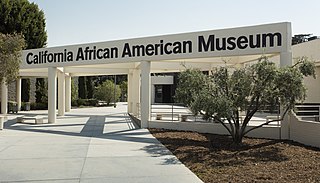Related Research Articles
Reparations for slavery is the application of the concept of reparations to victims of slavery or their descendants. There are concepts for reparations in legal philosophy and reparations in transitional justice. In the US, reparations for slavery have been both given by legal ruling in court and/or given voluntarily by individuals and institutions.

The African People's Socialist Party (APSP) is a pan-Africanist political party and organization working towards reparations for slavery in the United States, identifying ideologically with African internationalism and African socialism. The party was created in May 1972 by the merger of three black power organizations based in Florida and Kentucky. Omali Yeshitela has been chairman of the APSP since 1972. The APSP leads its sister organization, the Uhuru Movement. Uhuru, pronounced, is Swahili for "freedom". The APSP's stated goals are "to keep the Black Power Movement alive, defend the countless Africans locked up by the counterinsurgency, and develop relationships with Africa and Africans worldwide".
The "Slave Reparations Act" is a tax fraud related to the concept of reparations for slavery. The scam claims that filers can receive $5,000 or increased social security payouts for African-Americans born in the United States between 1911 and 1926.

Compensated emancipation was a method of ending slavery, under which the enslaved person's owner received compensation from the government in exchange for manumitting the slave. This could be monetary, and it could allow the owner to retain the slave for a period of labor as an indentured servant. In practice, cash compensation rarely was equal to the slave's market value.

Mindell Lewis Penn is an American politician from Richmond, California. She served on the Richmond City Council from 1999 and 2005. She is a graduate of the UC Davis Financial School of Management, and is affiliated with the "powerful" Bay Area group Black Women Organized For Political Action. She was an executive for PG&E working in community relations and finance, and was elected twice as the chairwoman of the Sacramento Urban League board of directors. She served on the Rosie the Riveter/World War II Home Front National Historical Park project committee.
Anthony Maurice Gifford, 6th Baron Gifford, KC, is a British hereditary peer and King's Counsel. He inherited the title of Baron Gifford on the death of his father, the 5th Baron, in April 1961. In 1970, Gifford was instrumental in establishing the first law centre in the UK.

Shirley Weber is an American academic and politician serving as the secretary of state of California. She was previously a member of the California State Assembly for the 79th Assembly District, which includes portions of San Diego, Chula Vista, and National City and all of Lemon Grove and La Mesa.

Reparations for slavery refers to providing benefits to victims of slavery and/or their descendants. There are concepts for reparations in legal philosophy and reparations in transitional justice. Reparations can take many forms, including practical and financial assistance to the descendants of enslaved people, acknowledgements or apologies to peoples or nations negatively affected by slavery, or honouring the memories of people who were enslaved by naming things after them. Victims of slavery can refer past slavery or ongoing slavery in the 21st century.

African American Californians or Black Californians are residents of the state of California who are of African ancestry. According to 2019 United States Census Bureau estimates, those identified solely as African American or Black constituted 5.8% or 2,282,144 residents in California. Including an additional 1.2% who identified as having partial African ancestry, the figure was 7.0%. As of 2021, California has the largest multiracial African American population by number in the United States. African Americans are the fourth largest ethnic group in California after Hispanics, Whites, and Asians. Asians outnumbered African Americans in the 1980s.

Belinda Sutton, also known as Belinda Royall, was a woman born in what is now Ghana who was enslaved by the Royall family at the Royall House and Slave Quarters in Medford, Massachusetts, USA. Additional details of Sutton's family life are under ongoing research. Baptism records for a son Joseph, and a daughter Prine, appear in church records. Belinda was abandoned by Isaac Royall Jr. when he fled to Nova Scotia at the beginning of the American Revolution. In Royall's will, a number of enslaved people are listed, but Belinda was unique in his wishes:
"In his will he gave his slave Belinda the option of freedom, and he further 'provided that she get security that she shall not be a charge in the town of Medford.' If she did not elect freedom, he bequeathed her to his daughter Mary Erving. Other slaves were bequeathed and some were sold, but Belinda was emancipated."
American Descendants of Slavery (ADOS) is a term referring to descendants of enslaved Africans in the area that would become the United States, and to the political movement of the same name. Both the term and the movement grew out of the hashtag #ADOS created by Yvette Carnell and Antonio Moore.

The Commission to Study and Develop Reparation Proposals for African-Americans Act, is an Act of Congress in the United States introduced in 1989 by Rep. John Conyers. The act aims to create a commission to examine the merits of introducing reparations to African-Americans for US slavery. The current iteration of the act is sponsored by Rep. Sheila Jackson Lee.
John Wayne Niles was an American politician, political organizer, an early Kansas pioneer, and civil rights activist. An African American, he founded an all-Black political party, the Indemnity Party, which advocated for reparations in the form of land grants for those formerly enslaved. Niles was one of the founding settlement leaders of Nicodemus, Kansas, a freedmen's town.
Mayors Organized for Reparations and Equity (MORE) is a coalition of U.S. mayors committed to paying reparations to African American citizens of their cities. The association was announced on June 18, 2021, in commemoration of the first federally recognized Juneteenth holiday. Mayors from such large municipalities as Los Angeles, Denver, Sacramento, and Kansas City are part of the coalition, as well as the mayor of the small town of Tullahassee, Oklahoma, with a population of 83.
The National Coalition of Blacks for Reparations in America (N'COBRA) is an organization that advocates for financial compensation for the descendants of former slaves in the United States.
The Evanston Reparations Committee was established by the City Council of Evanston, Illinois in 2019 as the first publicly funded reparation program for Black Americans. The first program approved for using the funds, cash payments for housing support, was passed by the city in March 2021.
The Philadelphia Reparations Task Force was created by the Philadelphia City Council in June, 2023. After meeting with the National Coalition of Blacks for Reparations in America, Councilmembers Jamie Gauthier, (D) and Kendra Brooks (WFP) introduced the legislation to develop the city's plan for reparations for slavery.
The African Descent-Citizens Reparations Commission in a commission created to determine whether or not the State of Illinois should award reparations to black people.
The New York Reparations Task Force was created by Governor Kathy Hochul to determine whether or not the State of New York should award reparations to black people.
References
- ↑ Arango, Tim (May 16, 2023). "Can Reparations Bring Black Residents Back to San Francisco?". The New York Times. ISSN 0362-4331 . Retrieved May 17, 2023.
- ↑ Lyngaas, Sean (May 9, 2023). "FBI disrupts Russian hacking tool used to steal information from foreign governments | CNN Politics". CNN. Retrieved May 9, 2023.
- 1 2 3 Kolhatkar, Sonali (December 21, 2021). "California Forms a State-Level Reparations Task Force". Yes Magazine .
- ↑ Clayton, Abene (January 29, 2023). "'California's first-in-nation reparations taskforce to release final report': The document could serve as a national blueprint for how states atone for their history of racial violence against Black residents". The Guardian.
- ↑ Karlamangla, Soumya (December 8, 2021). "California's Reparations Task Force Meets Again". The New York Times.
- ↑ Karlamangla, Soumya (March 4, 2022). "Who Should Get Reparations in California?". The New York Times.
- ↑ Sumagaysay, Levi (October 28, 2022). "California reparations push could give Black residents hundreds of thousands of dollars --- here's what they say they would do with it". MarketWatch. Retrieved October 28, 2022.
- ↑ Samuel, Leah (November 9, 2022). "Kamilah Moore and California's path to reparations". Harvard Public Health. Retrieved February 24, 2023.
- ↑ Ho, Vivian (January 9, 2022). "'If not us, then who?': inside the landmark push for reparations for Black Californians". The Guardian.
- ↑ "Reparations Task Force Members". State of California - Department of Justice - Office of the Attorney General. May 3, 2021.
- ↑ Gardiner, Dustin (May 17, 2023). "California's reparations process wasn't pretty — but could yield important lessons for the rest of the country". San Francisco Chronicle. Retrieved May 17, 2023.
- ↑ "California Task Force to Study and Develop Reparation Proposals for African Americans. Final Report. California, June 29, 2023."
- ↑ Arango, Tim (May 16, 2023). "Can Reparations Bring Black Residents Back to San Francisco?". The New York Times. ISSN 0362-4331 . Retrieved May 17, 2023.